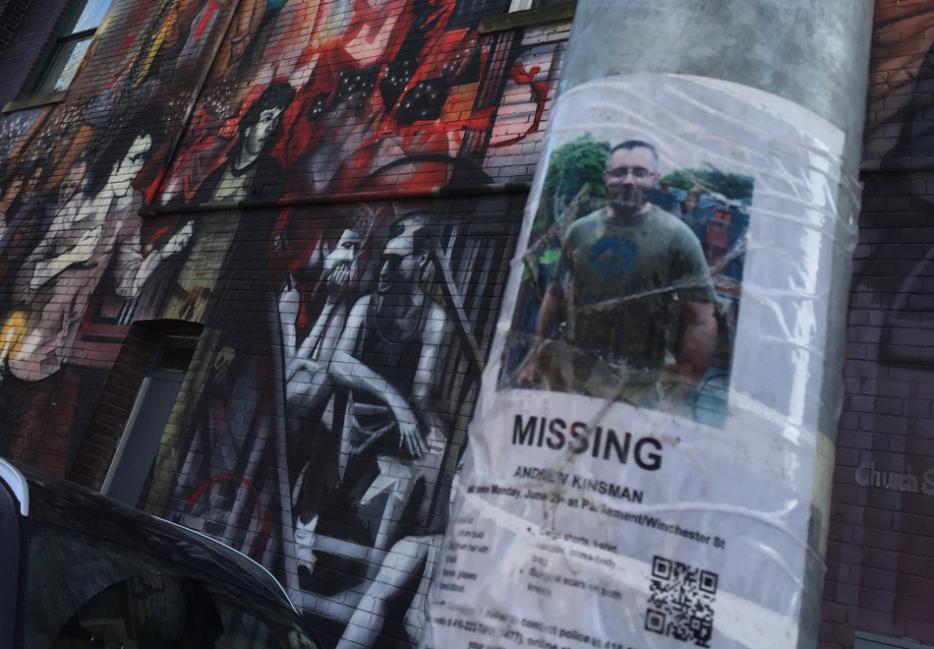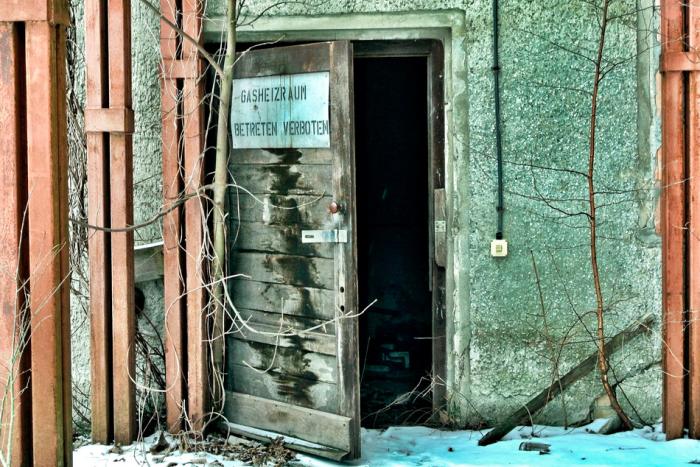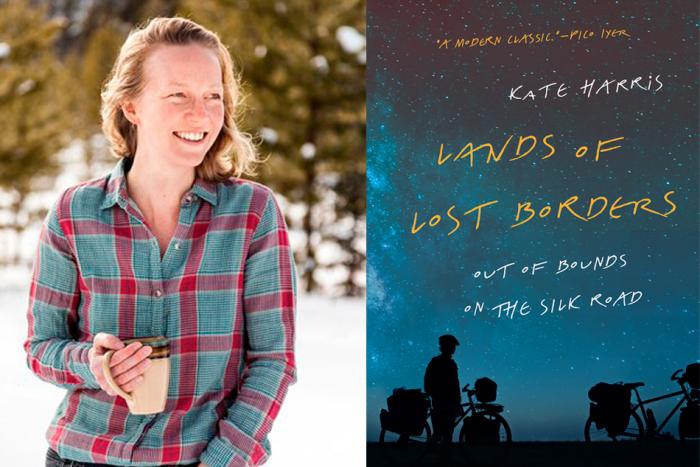“NO_ONE EVER REALLY DIES”
The massive letters are glued to the plywood around the construction site at 582 Church Street, near the centre of Toronto’s Church-Wellesley Village. The site used to be a bar called House-Maison. Once at a party a boy kissed me in the bathroom upstairs. He laughed, and then disappeared into the sea of people outside. It is derelict now, under perpetual construction.
The poster was hung there to promote the latest album from hip-hop/rock group N.E.R.D. (the underscore in “NO_ONE” is to make the acronym work), which was released December 15, 2017. You will have trouble reading the sign. Sometime between being affixed in late November and December 4, 2017, the company in charge of patrolling the site—O.B.N. Security and Investigative Consultants—moved its own placard, from where it hung nearby, to a few feet down and to the right, carefully obscuring the word “DIES.” There is an owl scowling on it—an image, presumably, of sleepless watchfulness. The outline of where it used to hang persists, its ghostly outline particularly obvious when it rains. Perhaps the word troubled them.
You will have trouble, too, finding out what the acronym O.B.N. stands for. It is not on the security company’s website, though there you will learn that among its executive board and founders are a number of former police officers or law enforcement personnel, and it is then that you might guess. If you haven’t, a bit more digging will lead you to a Toronto Star article from 2006, in which, amid a pitch from the firm’s vice-president for their services in divorce surveillance, it is explained as a joking reference to O.B.N.’s association with the Toronto Police. I call their offices to inquire about security work (I have been feeling unsafe lately) and they confirm: O.B.N. stands for “Old Boys Network.”
Walk past this constellation of signage and follow the plywood to where it ends. Squeeze past the cars parked there. On the building’s north-most side you will find a small alley, and stone steps down to a basement door. Next to overflowing recycling bins and garbage containers, in a spot that neither O.B.N. patrols nor police bothered to look, you will find a tall heap of dirt festooned with flowers, candles, and birthday cards.
You will find the spot where, on November 29, four days after she went missing, and one day before her birthday, Tess Richey’s mother found her daughter’s murdered body.
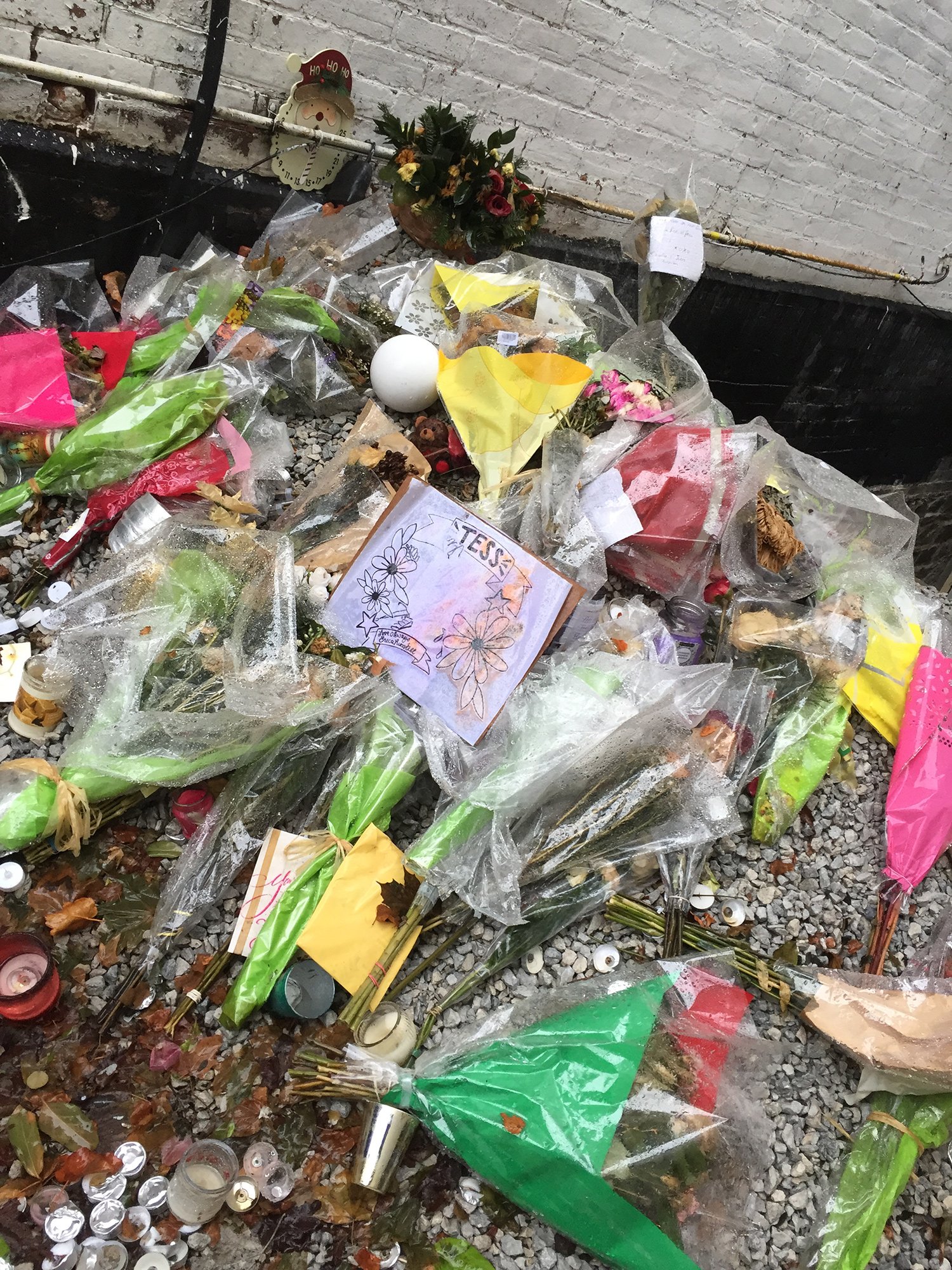
*
I am walking along College Street near Bay. It is raining. From an alcove entrance, over the railing of the building wheelchair ramp, a woman in a red vest shouts over to me.
“Come inside out of the rain and donate to Canadian Blood Services? It’s in you to give!”
“I’m gay,” I say.
She grimaces. “Sorry.”
*
He was a Mall Santa. This was the detail, culled from his Facebook page, that obsessed the press. We are still waiting for numbers—we are still waiting for so much—but it seems that this man who (it is, my editor wishes me to stress, alleged) had killed at least five men and probably many others would once a year put on a red suit and dandle the children of Toronto on his lap and listen to their fondest wishes. He smiled, and smiled, and still was a villain.
It seems now secondary that there are still gay bodies to be exhumed. That there was blood—gay blood—in the trunk of his car. Gay blood when it is donated is thrown out, and when it is spilt it is easy to forget, running unnoticed in the gutters.
Think instead of the children.
When I look at his Facebook page (it is now locked, but police left it up for several days) I see different angles of parties I attended—photographs taken on Church Street of the same Halloween costumes I had photographed just before him, giant candied skulls moving in a conga line through the crowd that made me tug on my friend’s coat: look, there. In his pictures I see an eye gazing where I gazed, and wonder if it gazed on me: darkly complected, stocky, bearded. Gay.
Maybe when the headlines shout “MALL SANTA!” this is the heterosexual community’s version of the same impulse: look where you were vulnerable.
*
It is mid December, 2017. We have been looking for Andrew Kinsman for seven months. His posters are still outside in the square and in the coffee shops. In all that time the police have insisted there is no connection between Andrew Kinsman and the rash of disappearances we have been seeing for years. Instead, they tell us to “be careful on the apps.” They do not explain why.
Project Marie, the 2016 police sting operation to lure gay men into sex in the park and then arrest them, is a year old.
Briefly, Tess Richey’s poster hung next to Andrew’s. “But I knew she was dead when the police came in to take down her poster,” a barista tells me. Outside the window is Crews & Tango’s, the drag club and dance space where Tess was last seen. Just a few steps north is where her body was found.
Do not congregate online; do not congregate in the park; do not congregate in the bar.
Tess’s poster has been replaced with one of the person of interest in her case: a slight, white man photographed by blurry CCTV cameras. Another predator, moving through the village.
“Did you talk to them? When they took it down?” I ask.
“Fuck no.”
*
It is mid January, 2018. I am sitting in the press conference for Andrew Kinsman’s family. We are in the 519 Community Centre; above the lobby bulletin board hangs a sign: “FAMILIES DEFINE THEMSELVES.” The conference is in the ballroom on the second floor. The last time I was here it was full of steamy bodies—the humid rain had moved the TreeHouse Party inside, and we danced in the microclimate of our sweat. I remember a friend’s hand in the small of my clammy back that made me wriggle and slap them away.
Now it is cold. Journalists and equipment personnel sparsely laugh and chat, milling near a hastily erected coffee station. One behind me loudly barks: “There’s probably a book in this!” The family is huddled, watching them. Watching us, I guess. They have just learned an arrest has been made. They have just learned, for certain, that their brother was killed. They are waiting for the body to be found.
They speak imperfectly, as all of us would. They think aloud of the child that Andrew was. Shelley Kinsman takes no questions after her statement. I watch her anxiously clutching and persistently rubbing a small black stone with both hands throughout. I never find out what it was. She looks like my mother, fretting at her rosary beads.
Andrew’s sister Karen tells a story about how her brother wanted to be a paleontologist, and how the family once hid a cow femur and convinced him there must be dinosaurs buried in the yard. He dug and dug until, ecstatic, he found the bones.
The room shifts uncomfortably and moves quickly past the infelicitous image.
“We looked for him in the heat, in the rain, and in the snow,” Patricia Kinsman says. Attend enough press conferences and you learn the strange synesthetic habit of a sudden burst of photos when the subject says something useful—as though the image captured could be made at all congruent to what striking thing was said. A sound like a group of bats taking flight as cameras go off: heat, rain, snow—that was everyone’s favourite pull-quote. A family in suffering, scouring for their prodigal brother lost in the big city.
I have yet to find an article that quoted what Kinsman said next: “We found homeless men living in tents. We met a transgender person afraid of living in a shelter as she had been assaulted and robbed. She lived under a bridge. We bought her lunch. We saw a young man sleeping under a bridge surrounded by bottles. In the forest we found needles and more. We never found Andrew.”
I wonder if the homeless woman they met was Alloura Wells, whose body was found in August in a ravine by a hiker, discovered during a coroner’s exam to be trans, and then neglected, no further identified, in a police morgue for months, until the noise from the family about organizing their own searches (as Alloura’s father put it, struggling with her pronouns: “It’s like [she’s] a nobody”) led them at last to identify her remains.
Probably not. There is after all no shortage of homeless trans people in Toronto. The moment, in any case, passes unremarked upon. (I later speak to Patricia by phone, and she confirms it of course wasn't: "I would have known Alloura Wells." I thank her for looking, at least, where police wouldn't.)
The Kinsmans talk around the problem of the other victims’ families, of the troubling optics of a killer caught after possible decades of activity because he finally killed a white guy. Greg Downer, who speaks with the sisters, says the search has reached out to Selim Esen’s family in Turkey, but they have apparently long “considered the matter closed.” They implore the family to call the police, whom they thank profusely.
“Remember him in your own way,” the sisters say. For their own part, “we know that wherever he is, Andrew is looking down on us.”
*
“Andrew did not want to look down from anywhere.”
I am sitting with my friend David at the Blake House, a pub just off the village’s main drag. The last time I was here was right after the Pride parade with my then-boyfriend. My shorts were ludicrously short and sparkly, and his eyes were very, very blue.
David slept with Andrew Kinsman a handful of times, and they were friends. It is a kind of relationship every gay man recognizes, but which the media has struggled to quantify. The Andrew that David remembers is not the child his sisters recall at the press conference, but a man who knew his mind—ruthlessly unsentimental, and very kind: “If ever there was a person that didn’t deserve it, it was him.” David looks down. “He was a big man.”
It is a peculiarly terrible feeling watching someone you care about picture someone they care about being disassembled.
The police have been busily peddling a vague warning to stay away from hook-up apps for months, to the exclusion of all other information and amid strenuous denial there was any evidence of a serial killer. Their denials, to David, amount to complicity: “Andrew disappeared in June. There’s a young man on that list who disappeared in August. If he is one of the victims, that is on the police.” He remembers the case of Jane Doe, who successfully sued the Toronto Police for their part in her attack by a serial rapist.
Instead, for David, the horror is that Andrew knew his killer: “The thing that pains me most is that he might have cared for this person, and been betrayed by this person in such a cruel way.”
I ask him about Tess Richey; about the queer voices in Black Lives Matter, whose press conference for the unveiling of the mural behind Hair of the Dog I once watched police perfunctorily scuttle after BLM had questioned the force's cosmetic image renovation; about Project Marie, and about the subsequent police uproar about being excluded from Pride. Was this laxity of their mission to serve and protect meant to be punitive?
“All of this has laid bare the fact that we are alone,” David says. “We have no superheroes. We are alone. It is the queer community that has done the most work. It is the queer community that has developed strategies.
“And now it is the queer community who mourns.”
*
I am in the Glad Day Bookshop with a Paper Plane (bourbon, amaro, Aperol, lemon juice) and a book (Midsummer Night’s Dream) when my ex-boyfriend spots me in the window and comes in to say hi. Then: “I hear they might be up to four bodies.”
We talk about how they will probably give him a name. The Mall Santa thing, probably, or something about the gardening. My ex tries the cocktail, and I feel the momentary course of a thrill at the gesture’s casual intimacy.
His eyes are still so blue.
He is late for something, squeezes me goodbye, and he is gone, and I am alone again with my book.
*
City TV posts a report about the murders. My cousin, to whose face I once denied I was gay when they cornered me at a wedding years ago (“But I saw you!” she pressed. “I just live near the village, so I’m there a lot,” I stammered, my face hot), spots me in the pre-roll, and tags me. I read the Facebook comments.
Del Core Domenico says: “You don’t like cops, now you pay the ultimate prize.” Laughing emojis.
Sandra Wieland says: “Why does the media say gay men were murdered. Do they say straight man shot last night. Stop the labels. We are the human race.”
Wayne Kennedy says: “Leave the police alone they are doing a good gob there [are] other cases to solve.”
Andrew Brown says: “So 2 makes u a serial killer?”
Tom Pearson says: “A bit much to say police won’t do a thing. Division is not helping.”
Chris Kolmel says: “They could have just not bothered looking for the killer. Just coming off as looking stupid”
Dre Khaloo says: “Let’s not forget LGBT ppl u were the 1’s who told the cops not to show up at pride wearing their uniforms catering to the demands of blm so shut ur holes An deal with it”
Richie Zina says: “Confused gays. What about aids? Why are they still so quiet in that? I’m sure aids kills thousands more than this guy did….”
I close Facebook.
*
I am sitting on the second floor of the village Starbucks, grading a student’s late paper. I become vaguely aware that behind me an older man is explaining to his companion how Grindr works.
“See, these people are all nearby! It changes every time you sign on. I had sex with this guy once. Some of these people are even in this café! Look, there’s that guy!”
To my left across the gulf of the stairs a gentleman sitting alone at a table conspicuously pretends not to hear.
Two police officers, a man and a woman in the Toronto Police yellow winter jackets, walk up the stairs holding coffees, obviously on break. The same old man behind me jeers loudly: “Uh oh, the POLICE are here! I hope nobody in here did anything WRONG!”
The police officers, also, pretend not to hear.
When one of them goes to the bathroom, the old man again heckles him: “Better check if there’s a MURDERER in that bathroom! Better get him this time!”
The officer tries the door, but does not know the code (I know it but do not volunteer it). Instead he returns to his partner, and they hastily leave.
I try to follow to ask them if the jeers are typical lately, but when I get outside they are already in their squad car, pulling away.
I wonder if this is their normal patrol, and if so, I wonder if they are the same cops who, when arresting a man at the southern-most margin of the village a year ago were caught on cellphone video tasering a man while down and insisting to an objecting observer to watch out for the suspect, “because he’ll spit in your face and you’ll get AIDS.”
I wonder if they’re still mad they didn’t get to march in their uniforms in the parade, expecting cheers from the people they’ve left for eight years to die while a murderer picked us off, while across town they arrested us in parks for having sex, and electrocuted us in the streets.
Maybe that is uncharitable.
*
Since June 12, 2016, I have not once walked into a gay bar or café or community centre without thinking, “I wonder if today is the day someone decides to kill us.”
Not once.
*
Alex is 23—the age, by five days, that Tess Richey never lived to see.
Alex is non-binary and bisexual, and came to Canada because they believed it was more welcoming and open. They want to ask for my advice about grad school (my advice is what it always is: don’t). We are talking in Glad Day, and around us the daytime coffee shop shimmers, dims, and transforms into a quiet night-time pub. This used to be a club called Byzantium, and the floor still has the tracks that split the dancefloor from the more intimate section where the music meant you had to lean in close while lights drew zigzags on the other person’s face.
When straight people imagine coming out they imagine a tearful, dramatic revelation all at once, but Alex’s story is like mine: by degrees, when it’s safe, when it’s too late for them to ruin your life. Coming out is brave not because it is vaguely “scary,” like a school play; it is brave because it is dangerous. Some people get violent; some punish you financially; some just love you a little less, forever. You let them see the little fraction of yourself that you can trust them with, because you’ve learned love is almost always conditional. Surviving is brave, too.
Bitterness is always possible. Instead, Alex’s kindness has a ferocity of its own; they are a volunteer for every LGBT cause imaginable, and I quickly learn have a distressing habit of crying out to interject “poor thing!” at the exact moment in your anecdote when you are describing the person you are trying most to vilify therein.
More than anything else, Alex loves anime. Their free time (of which their volunteering does not afford much) is devoted to “magical girls”—the genre of which Sailor Moon is the most identifiable example to Westerners. They are highly choreographed stories in which the powerless and disenfranchised are transformed into gossamer agents of justice: beauty and love triumphant, never sacrificing an ounce of vulnerability or compassion to do battle against exploitative evils.
I ask about the disappearances, about Tess Richey, and about Alloura Wells.
“The police aren’t doing anything but when have they ever?” Alex asks, sadly. “We protect each other.”
We talk some more about magical girls.
*
I leave class at 11 a.m.—a lecture on Shakespeare’s Richard II—to 14 texts from my friends. The death toll is now at five.
On the TV above the café bar I watch forensic personnel dressed all in white dragging enormous flowerpots from a property in rural Ontario. There are bodies in the soil.
Unbidden my mind flashes back to the end of the play. Full of baroque images of the horrors of power, it ends with a last one—a new king, crying crocodile tears, for the victim whose death he didn’t quite order, but tacitly condoned, even as he punishes the murder:
Lords, I protest, my soul is full of woe,
That blood should sprinkle me to make me grow. (5.6.45-6)
What is power? A beautiful flower, whose earth is soaked in blood.
In Shakespeare, eulogies are the privilege of murderers. On the TV, the police spokeswoman speaks, but the TV is set mercifully to mute.
*
It is Thursday night and the high holiest of days: the premiere of RuPaul’s Drag Race. We are upstairs at The Drink: my sisters, Joe, and David (a different David—there are a lot of gay Davids). My friend Paolo is in the crowd. The bar is packed to its rafters—sitting on the floor beneath our high-top, a gaggle of teen self-identified “bio-drag” apprentices are watching the stage, enrapt, while Ivory Towers holds court.
Ivory Towers is, by day, Geoffrey, a reserved barista whose insta-feed is replete with high-concept foam art and whose lattes are excellent despite being herself lactose intolerant (“Which is also why I can’t suck uncut dick,” she drawls mournfully to the crowd). In costume she is green-haired and in a space-age Barbarella catsuit whose rhinestones catch and scratch when you hug her. The crowd adores her.
During a commercial break I am pulled onstage, and acquit myself admirably in trivia until the lightning round, when I forget that Ru’s fictional airline is called “Glamazonian Airways.” In my defense, I am rather drunk. Smelling blood in the water, Ivory takes the opportunity to tear me apart; noticing the “A” on my shirt, and the solid three weeks since I’ve been to the gym, she cries out: “Alvin, Simon, and Theodore, and it looks like you ate all three!” Afterwards, offstage, we both down a shot of Fireball.
I am incandescently happy.
After the lip-sync and very just elimination of tacky and mean-spirited contestant Morgan McMichaels, my sisters and I spill down the steps, the air pleasantly cool after so many raucous bodies hooting and cheering upstairs. Across the street is Crews & Tangos. I remember that Ivory was almost certainly hosting there the night Tess Richey died.
I hope, before the horror, that her last night was as beautiful as this one.
*
In the heart of the village, behind the 519, in the park across from Tess Richey’s alleyway memorial, you will find a bank of roses, and among them on plates a list of names. These are Toronto’s dead, lost to AIDS, when no one in power cared to act, when the old boys' network raided the bathhouses and the parks and the bars.
In the summer we hold a vigil, and by candlelight we recite their names, and we recite the names of those killed at the Pulse massacre, and we recite the names of anyone else who was loved and lost. This year we will recite new names.
Their names were Selim Esen. Skandaraj Navaratnam. Majeed “Hamid” Kayhan. Abdulbasir Faizi. Soroush Mahmudi. Dean Lisowick. Andrew Kinsman. Alloura Wells. Tess Richey.
There are more names. There will be more names still.
And we will forget some. And we will not know how many died in silence and in secret and alone. No one will tell those stories. No one will know how.
*
“NO_ONE EVER REALLY [THIS PREMISE IS UNDER PHYSICAL AND ELECTRONIC SURVEILLANCE BY OBN 1-866-626-5900]”
I have been staring all week at that mutilated poster: another piece of our vandalized history, another scrap pasted onto the palimpsest of this neighbourhood, another fragment forcibly overlaid atop another fragment, out of which we are expected to assemble some measure of coherence.
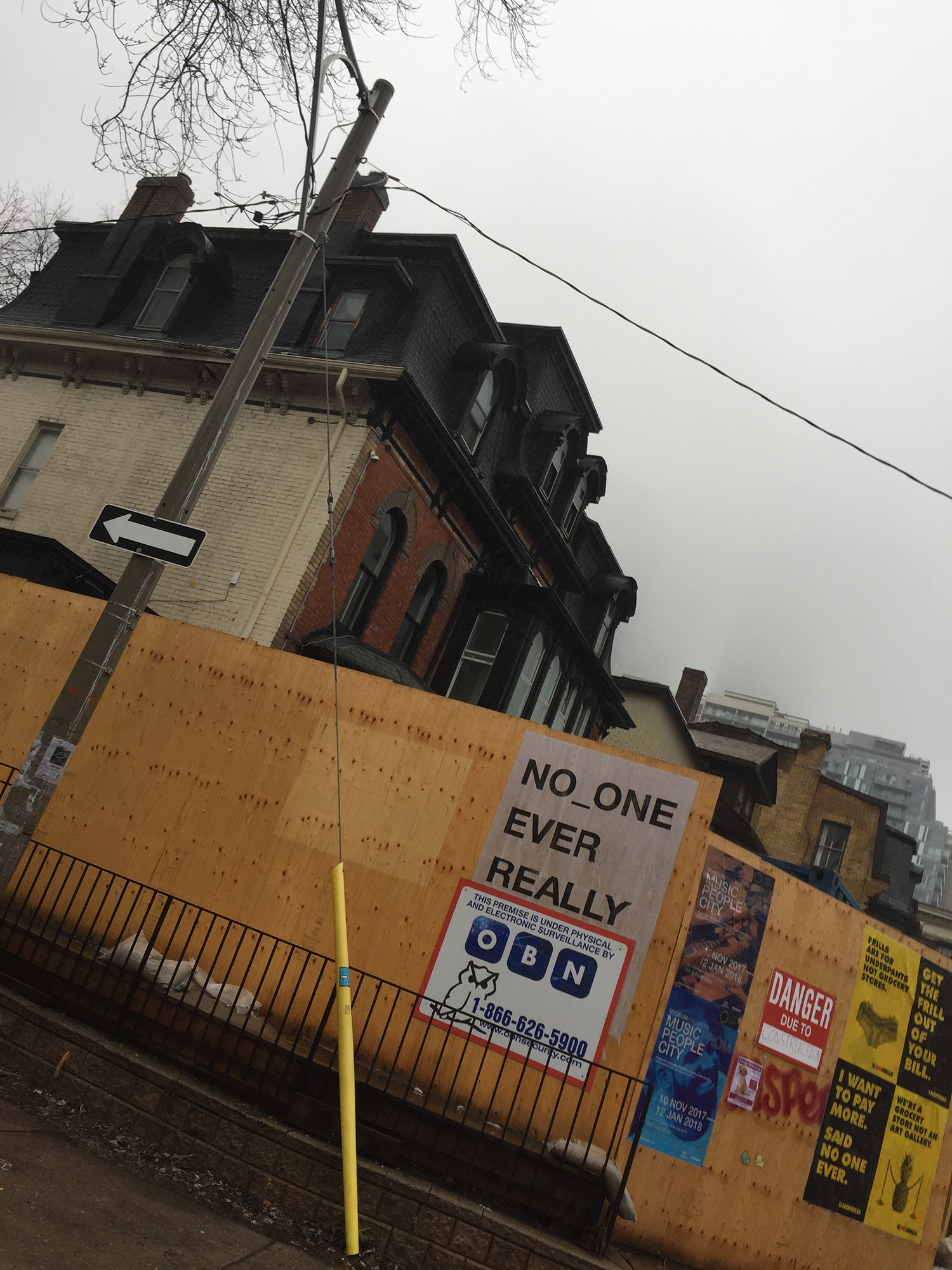
It is the product of crass marketers peddling positivity, and then careless old men seeking to conceal anything that might invite the discovery of their own guilt in creating the conditions for a predator to prey.
I have no sense to offer. Maybe offering sense is just another violence—another sign moved to cover something up.
But still: when you make “NO_ONE” into one word you fuse a noun to its adjective, making a new noun—a “no_one” that is nevertheless a thing.
Queer people are so often born in isolation—we have to find each other, have to excavate our history, have to build new families to replace the ones who abandoned us. To walk in the village, for me, is to walk in these overlapping histories: through my own, through memorials, through the sites of arrests and beatings and a thousand indignities and intimacies.
We are never one. Not really.
__
This story has been updated to clarify details related to the Kinsmans' news conference.


